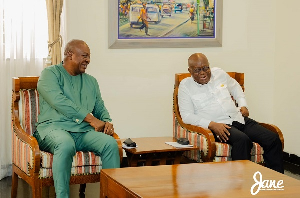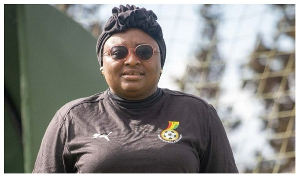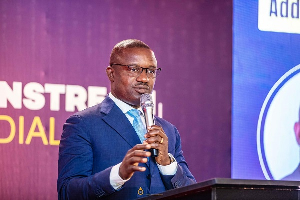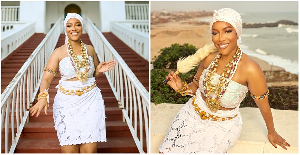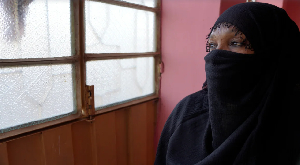...But as Ghana needs the party for our democracy??the party needs soul-searching!
Reflections
Political parties are the wheels on which modern democracy spins and when they lose their focus and momentum, the entire democratic system stands threatened. In liberal democratic systems such as the one being nurtured in Ghana, it is political parties that serve as the podium for mass participation and mechanism for public accountability. The bitterness with which elections are contested sometimes evokes enmity among political opponents but the truth is that in every truly democratic system, it is in the interest of the people and political process itself to keep more than one party. This is because any political system that lacks plurality and alternatives is nothing but authoritarian and undesirable. Dissent and alternatives views are not only essential aspects of human nature; they also form the foundation of the civilization that challenged the divine rights of kings in the period of enlightenment. Whilst plurality is important in a political system, it is the ability to manage the dissent, disagreements and emotional outburst from a pluralistic system that adds to the beauty of democracy. This is the philosophy of multiparty democracy. Therefore it is very important for each political party in Ghana to constantly remind itself that its meaning and relevance is defined in the existence of the other parties. NPP must exist because the NDC, CPP, PNC, and the others exist. This fits well with the old African philosophy of ?I am because we are, and because we are, I am.? Political parties are different from other human associations due to their overt intention to gain power, use it and where possible expand national influence. Being different therefore implies political parties must be guided by well thought-out ideas and ideals, be managed by principles and values, and above all must be governed by the codes of tolerance and equality. This article shares some reflections on the NDC and concludes that its defeat in the 2004 presidential elections was inevitable for reasons both internal and circumstantial but the party is still relevant for our democratic growth.Formation
Unlike the other political parties which were formed from ?without to within? the NDC remains the only political party in Ghana today that was formed through the extensive use of state machinery, power and resources. The last four years in opposition has exposed the NDC to the hash realities of life out the corridors of state power. Parties formed out of state power are like children born with silver spoons in their months, they grow up totally ignorant of the hardness of life and assume everyone lives in their kind of world and often go wayward. The NDC fits this metaphor. Usually when political parties are formed out of opposition to the existing power structure, as they progress, it is easy for them to look back to a common historical bond to enkindle a sense of unity among its members. With time, such political parties develop processes of socialization based on the same historical bond as a means of transmitting to younger generations, the values the party shares, and the same process doubles as the mode of recruitment.Unfortunately, the NDC did not avail itself to merits of historical events that have the magic to evoke nostalgic feeling among its rank and file. On the contrary, the NDC?s strong affinity with PNDC continues to hamper its electoral prospects. Whilst many Ghanaians struggle on daily basis to erase the bloody days of the PNDC from their memories, the NDC continues to parade the very individuals who perpetrated the gruesome acts of the PNDC, as its top party functionaries. By implication, any thought of the NDC immediately evokes the ghostly images of human right abuses that Ghanaians witnessed in the 1980s; but the irony is, the party today, has some of the finest and toughest minds the country needs for development. In fact every major political party in Ghana, has some ugly historical record; one can recall the NPP tradition?s famous ?matemihu?, ?no court? and flirtation with the American CIA to overthrow Nkrumah.
Also Nkrumah and his CPP?s PDA that threw some of the nation?s greatest politicians to jail are still fresh in our minds. To a degree, the re-incarnated forms of these political traditions in the 4th republic have succeeded in distancing themselves from the ugly days of their traditions. Perhaps the NDC could not decouple because PNDC?s history to which it is clinging is still fresh and too recent. Critically viewed however, the NDC?s inability to decouple from the revolutionary rhetorics of the PNDC attests to the importance of history to political party?s development and growth. The need to fall back on something in the past always beckons political parties hence the NDC cling to the PNDC?s legacy must be understood as a struggle by the party to hold on shamelessly to ?something? irrespective of what that ?something? is; and now like a drowning man holding on to a strew, the party is sinking gradually yet unlike the drowning man, it may survive.
The NDC & Founder Theory
Surviving in our kind of political system means the NDC must carve for itself a new public image and completely dispose off the party?s strong adherence to the ?founder theory.? The ?founder theory? is the devil within. Political parties are not sole-proprietorships formed and ran by one man and his family. Political parties are about people just as they are the forum for exchange of ideas, debates, views, civic dissent, and respectful disagreement. No one man can be a forum unto himself, no one man can be a political party unto himself, no one man can be forum for the exchange of ideas, and no one man can be the theatre for hot exchanges and debates. It takes people to have all these done. The idea that Rawlings is the founder of the NDC and must continue to have the ?final? say in the party is both absurd and folly. Rawlings has exhausted his time in Ghanaian politics as allowed by the constitution to which he was the signatory. Despite the limitation of his intellectual strength, he still remains one of Ghana, and perhaps African most influential leaders and history may inscribe his name in gold, but it appears the man is already undoing the great place history has reserved for him. The lingering image of Rawlings in the NDC is a potential danger for our democracy but most seriously for the NDC itself. Following the news from afar, it became clear that in election 2004, the former president did not only out-staged the presidential candidate of the NDC?Atta Mills, in term of rhetoric and charm, but also received the highest media coverage than any other candidate in Ghana including the incumbent-John Kufour of the NPP. If at the time when Rawlings is expected to take a back stage in the NDC and allow his preferred choice-Atta Mills to assume the place of public focus he still receives such huge media coverage, then the NDC needs some self examination.What is more, for most of the time that Rawlings was in the spotlight, his comments and actions though, were meant to advance the cause of the NDC produced the opposite results. In most instances, he was either delivering ?boom speeches? or loitering around the ?Bongo junction? heckling public officials. Many Ghanaians perceived, and rightly so, such behaviors as unbecoming of a former president and a statesman. Those individuals in the NDC who continue to argue that Rawlings is an asset that the NDC must use in enhancing its electoral chances are living in a world of illusion and fantasy. Public responds to Rawlings? populism is based on several factors that have nothing to do with electoral choices. The limits of this reflection would not permit a discussion of those factors but for some Ghanaians, allowing Rawlings two terms as constitutional Head of State was the surest way of showing him the exit door in Ghanaian politics. For such individuals, the lingering image of the man in the NDC is enough a reason to oppose the party and vote against it under all circumstances, unfortunately for the NDC, individuals with this sentiment have grown over the last couple of years due to the conduct of Rawlings.
One dangerous aspect of the ?founder theory? is that the fact that it harbors the seed for the destruction of the party itself; and the history of political development in Ghana attests to this claim with many examples. Gbedemah?s Alliance of the second republic died with his ambition, Kwabena Darko?s NCP collapsed with the demise of his presidential bid; where is General Emmanuel Eskine?s PHP,? Where is Wereko Brobby?s UGM? How is Owureko Amofa?s EGLE party faring? How is Dan Lartey?s GCPP faring? How is Limann/ Mahama PNC showing? Is Goosie Tandoh?s Reform party alive and relevant? Has Nknrumah?s CPP any future beyond what we see now? Who hears about the TCP these days and who cares if the GDRP once existed? These were all political parties that have collapsed with the ambition of their founders or struggling to survive with little hope of ever capturing political power. What they share in common is the ?personality cult? of the leader/ founder which eventually drew the dagger on them with the exit of the person himself from politics.
This must provide ample lesson for the NDC if it is to survive the current chanllege of ?personality cultism? that comes with its ?founder theory.? It is deceptive to argue that the broad-based nature of the NDC would immune it from the fate of these other political parties. But don?t forget no party in the history of Ghana could match the CPP?s support and grassroots base in the 1960s. Several years after the overthrow of Nkrumah, today, the CPP is not counted among the three parties with popular support in Ghana. In an earlier article www.ghanaweb.com/GhanaHomePage/features/artikel.php?ID=63301 published in August, this author argued that the NDC is the more broad based than any party in Ghana; that assertion was misunderstood by some of those who responded to that piece as saying the NDC was the party with the largest support or following. There are clear differences, simply put, the NDC has significant following in each region in Ghana and has MPs coming from all ten political regions in Ghana to the national parliament. Even this enviable position of the NDC is changing with the NPP?s first parliamentary gain in the Volta region?a traditional stronghold of the NDC.
Perhaps, Rawlings must be told in no uncertain terms that the NDC belongs to Ghana and Ghanaians collectively and that his monopoly as well as his hanging image on the party is immensely negative. When the NPP announced in the course of the 2004 electioneering campaigns that Rawlings was the unofficial manager of their campaigns, it sounded as a comic relief but, to the critical mind, it came across as a strategy to draw attention to the damages Rawlings was doing to the NDC, and a conscientious call to the NDC to come out of the shadows of Rawlings and contest the elections with good spirit. Unfortunately the NDC held on to its ?straw? and now it pays for it dearly in the just ended elections. In the earlier article, this author stated that ?there is no particular reason to believe the NDC will win the 2004 elections because large sections of the Ghanaian society are still suspicious of the NDC, the party has allowed the image of Rawlings to dictate its pace too many times, the Ghanaian media is still uncomfortable with the NDC; and some of its leading members still project the image of arrogance and show no persuasiveness in their public comments.? This contention has been vindicated.
Demagogues, Dinosaur, Factionalism & Violence.
Every party in Ghana has quite number of undesirable elements. But this is nothing to worry about because political parties reflect the microcosm of the macrocosm in all societies. It is therefore normal to have a mix of both the good and the bad. However, the opportunistic behavior put up by the General Secretary of the party few days before the elections shows the there are lots of political dinosaurs and demagogues parading themselves as party officials. If the General Secretary of the party, a lawyer by profession could fall prey to the political tricks and pranks of the ruling party, then Ghanaians have lot to worry about in deciding on the electoral fate of the party. Indeed, the NDC outwardly projects the image of a very fragile political establishment. The two main factions within the party?Obed and Rawlings factions have long unmade the NDC presidential chances even before elections. One could read pretense and hypocrisy on the demeanor of Obed anytime he speaks on a political platform. Obed?s comments about Atta Mills days before the elections showed very clearly he was not for the victory of the party at least not when Mills remains the presidential candidate. Though, the comments could be judged as frank expression, the timing was wrong and coming from the Chairman of the Party, they were unwarranted.Furthermore, the actions of the former president at both Ashiaman and Bongo scared many Ghanaians who would have voted for the NDC to do otherwise. Due to the real or perceived affinity that exists between the former president and the NDC, it is very difficult for many Ghanaians to separate the action or inactions of the man from the activities of the party. The NDC has been cast in the image of violence due the in part to the PNDC?s old stories, and partially to the long pattern of violence the ex-president has established. He was famous for slapping cabinet ministers including his one time vice-president; he chased and turned taxis upside down, made boom speeches calling for civil disobedience and in more recent times heckled some individuals at Ashiaman and Bongo. Whilst Rawlings may have been doing some of these things to satisfy his populist instincts, unfortunately so, most of all these cast a very negative slur on the NDC and its members who may not have authorize the actions in the first place. What becomes worrying to most Ghanaians is the fact that Rawlings is often not left alone to defend his actions, rather, party officials hungry for publicity rush to his defends thereby unmaking themselves and what they stand for. This is where some NDC officials continue to play into the hand of some media practitioners in Ghana who vowed to see the NDC?s demise. Prof. Mills comes across as a likable man, but one finds it very difficult to dissociate him from the kind of image created for the party he represents.
NDC OPTIMISM
In spite of the seeming influence of the demagogues and dinosaurs in the NDC, it is undeniable that it has some of the finest MPs in Ghana?s parliament. This single fact is what stands as the beckon of hope for the NDC?s future in Ghanaian politics. This invariably must give optimism for our young and democratic nation. The premises of this article is that as a nation, we must guide against the slide into one party politics, and certainly that is not what the NPP wants either, besides there is no evidence of that yet, but the caution is worthwhile, if our history with the CPP is something to reflect upon. The NDC?s showing at the parliamentary elections stands very encouraging particularly with the entrance into the House by new firebrand MPs. In the article alluded to earlier, it was argued that it is in the interest of our democracy and the NDC itself, to remain in opposition a few more years, Ghanaians deserves the congratulations for granting this wish. NDC still have some soul searching exercises to do. The post-election meeting held between the NDC MPs and the former President perhaps was the most opportune time for the ?Honorables? to have told their mentor how much he is unmaking the party he so much sees as his baby; but as it turned out, that meeting was just an open forum offered Rawlings to lecture the MPs on party sustainability and democratic governance. Very ironic! Funny enough, that meeting itself is another step to deepening the factionalism in the party. The absence of the NDC general secretary at the meeting could be understood because of the $ 3000 scandal but it is difficult to comprehend how the chairman of the party could be ignored in such a strategic meeting. The optimism of the party stands very threatened if the structure and command is not separated from personalities and petty squabbles.Conclusion
Perhaps, it is about time the NDC listened to honest views and advices outside the official circles of the party. The NDC also has a lot to learn from other political parties in Ghana and elsewhere. As long as the sense Ghanaians get from the party in terms of the actions of its key individuals contradict the written philosophies they aspire to, Ghanaians will keep them where they belong. The NPP, for example, is not a sacrosanct party but it projects the image of internal unity and comes across as one with explicit structure and enduring chain of command. Behind the scene however, it knows how to manipulate the public to follow its lead, bait its strongest opponents like Josiah Aryeh, flirt with the media and claim in a deceptive way to be people-oriented. In party politics, as long as these propaganda tools do not interfere with governance and national interest or security, they are fine and portray the party as strong. The NPP has that advantage now. As a nation we deserve the right to be concerned about all the political parties in Ghana because they are the social organizations that expect us to trust them with the use of our national resources. For now, Ghanaians are watching how the NDC MPs will perform again in the new parliament because the party?s future lies in their services to the nation. Too many walk ?outs in parliament may be fatal for the party?s 2008 chances, continuous but objective pressure on and exposure of NPP scandals as in the case of the fake loans, may enhance the Party?s chances depending on how such discoveries and exposures are communicated to us. As noted in the earlier article by this author, the real drama is schedule for December 2008. The suspense of that show can already be felt as no one knows who the major characters would be. Deciding on the characters will be one hurdle all major parties in Ghana would have to clear before the action is due in 2008. The NDC may have to guide against declaration-style of its major character, it may have to put up a protest against imposition from ?above? and may for once conduct its activities devoid of bitterness and ?macho-bashing? of opponents. Where bitterness and factions developed, the party must create a mechanism to accommodate them not suppress them. The NPP has done this over, and over so they are the master of the game. But looking at NPP today, it is doubtful if they have any credible and strategic presidential candidate for 2008, maybe Nana Akuffo Addo,--he is more credible and resourceful but obviously not strategic for NPP. Courage Quarshigah comes across as a very credible and strategic but perhaps lacks the resources. The talk about Osafo Marfo, Santo?s brother, is a joke that reminds us of the comedies of his late brother?Santo. The man, like J.H. Mensah will never be president of Ghana. John Mahama is the NDC?s strongest advantage and the party must cash on that. He undoubtedly has broader support that cuts across party lines and he is often, very affable with everyone and persuasive in his public comments. He projects the image of victory over anyone the NPP puts up but has he the resources? Let the drama unfold. But first, let the inter-elections years be devoted to bipartisan approach to national development and progress.







